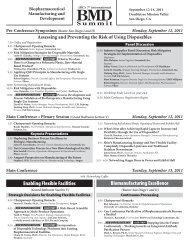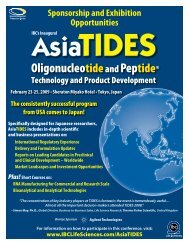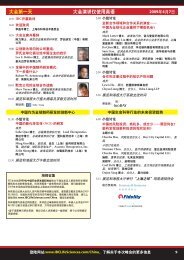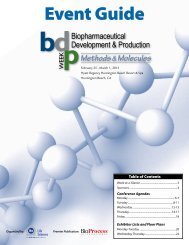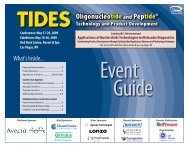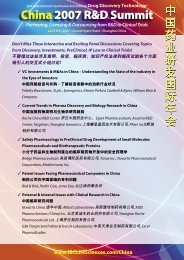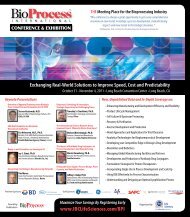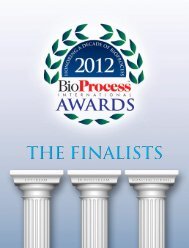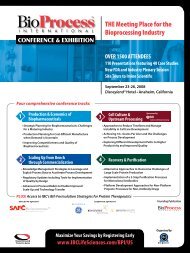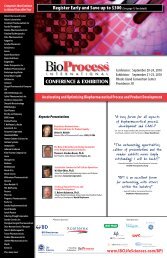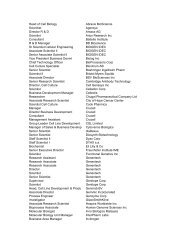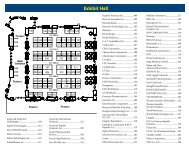Conference ⢠Tuesday, October 2, 2007 - IBC Life Sciences
Conference ⢠Tuesday, October 2, 2007 - IBC Life Sciences
Conference ⢠Tuesday, October 2, 2007 - IBC Life Sciences
You also want an ePaper? Increase the reach of your titles
YUMPU automatically turns print PDFs into web optimized ePapers that Google loves.
Two-Day Courses • Monday, <strong>October</strong> 1, <strong>2007</strong> to <strong>Tuesday</strong>, <strong>October</strong> 2, <strong>2007</strong>Maximize your learning experience at BPI … combine one of the following training courses with thescientific conferencce sessions on Wednesday & Thursday at a special 4-day rate. See page 25 for details.Technology Transfer ofBiopharmaceuticals 101:Ensuring Successful Transfer andImplementation of ProcessesYou will Learn:• The fundamentals inherent of all types of technologytransfer• The tools required to create and implement atechnology transfer• About the key players on technology transfer teams– who, what, when• How to avoid the common pitfalls inherent in alltransfersBenefits of Attending:• Learn the different types of technology transfer andhow to design and implement programs specific toeach type of transfer• Understand the technical and regulatoryrequirements for successful transfer• Explore the different types of team structures usedin various types of technology transfer programs• See why tech transfers “go wrong” and learn how toavoid the common mistakes• Receive a comprehensive course book that serves asa future referenceWho Should Attend:Scientific, regulatory, and quality personnel involved indesigning, conducting, participating, or reviewing thetransfer of production processes (both upstream anddownstream), analytical methodology, and entire drugprograms. This includes managers, supervisors and staffmembers from R&D, production, engineering, QC,quality assurance and regulatory affairs groups.Course Description:Transfer of developed processes or procedures betweengroups and/or sites has been, historically one of theweak links in the biopharmaceutical chain. This coursedetails the technical, regulatory, and philosophical issuessurrounding the process of technical transfer. Definitionsand examples of the different types of transfers, includingdiscussions on the levels of complexity inherent in eachtype of transfer will be discussed. Topics will includeproject management, team structure, implications ofengineering, scale-up, and comparability programs. Byattending you will learn what makes for a successful andunsuccessful transfer as well as participate in exercisesto help delineate the skills required to participate in atransfer process.Introduction toBiopharmaceuticalManufacturingYou will Learn:• Fundamental processes and operations in themanufactureof biopharmaceuticals• Primary issues faced by manufacturing anddevelopment personnel and how to overcome them• Regulatory aspects of manufacturing and the role ofmanufacturing in meeting quality standardsBenefits of Attending:• Gain an overall perspective on the manufacture ofbiopharmaceuticals and the component steps usedin production• Gain an understanding of the technology employedin manufacturing, even if you have a non-technicalbackground• Identify the major methods for testing and wherethey are used• Understand the concepts underlying processvalidation• Receive a comprehensive course book that serves asa future referenceWho Should Attend:• Individuals who need a working knowledge ofbasic biotechnology design principles, or whoare responsible for process design, facility design,equipment/system design/selection or operation of abiopharmaceutical production facility• Those who are involved in biopharmaceuticalproject engineering and management or QA/QC,facility design, or facility construction• Individuals beginning work in productionoperations, quality assurance, regulatory complianceor other areas in a biopharmaceutical facility orbiopharmaceutical development companyCourse Description:This course introduces the fundamental processes andoperations in the manufacture of biopharmaceuticals.Beginning with expression systems and moving throughfermentation, cell culture, recovery, purification,formulation and filling, we will discuss the process stepsinvolved in producing biological products. We willalso introduce the basic concepts of process design andanalytical methods for characterization of biologicalproducts. The course will conclude with a description ofthe role of quality and the regulatory environment underwhich biologicals are produced, including validation.Though the manufacture of biopharmaceuticals iscomplicated and difficult, this course will provideperspective around the many operations that make upa manufacturing process and help you understand howthey work together to provide safe and effective products.Design of Experimentsin BiopharmaceuticalDrug DevelopmentYou will Learn:• How to apply Design of Experiments to developcritical parameters for biopharmaceuticalmanufacturing and analytical development• How DOE leads to efficient drug development bysaving cost and resources• How to demonstrate that you understand yourprocess by generating imperical models from yourdata• How to identify critical process attributes andinteractions for robust product specificationsBenefits of Attending:• Gain understanding of the criteria for establishingprocess control parameters• Interact with fellow process development andprocess validation professionals who are trying toaddress similar issues• Gain understanding of how your process meetscritical quality attributes• Optimize strategies to reproducibly align yourprocess control parameters with meeting finalproduct specifications• Use hands-on training in protocol design tosuccessfully support drug development activitessuch as: Assay Qualification, Pre-Validation,Manufacturing Process• Receive a comprehensive course book that serves asa future referenceWho Should Attend:This course is tailored to process development scientists,engineers, and managers. Biopharmaceutical processesare studied to determine the process control parametersand ranges of acceptable operation.• Engineers, managers from product development,manufacturing, research and quality control• Project directors in process development tooutsourcing• Professionals from Pre-IND, Phase 1, 2, 3 throughclinical trialsCourse Description:In this course, you will learn about Design ofExperiments and how to use designed experimentsto perform efficient Drug Development inbiopharmaceutical manufacturing processes. You willexamine and have an understaning of formulation andanalytical development and how it relates to DOE.Designed experiments are a powerful tool to improveproducts, processes and practices to determine the cuaseand effect relationship between controlled variables andoutputcharacteristics. You will also learn to improveprocess output characteristics including quality, cost, androbustness through generating empirical models of yourprocesses in the fewest experiments possible.20 Visit www.<strong>IBC</strong><strong>Life</strong><strong>Sciences</strong>.com/BPI/US for up-to-date information on this event



